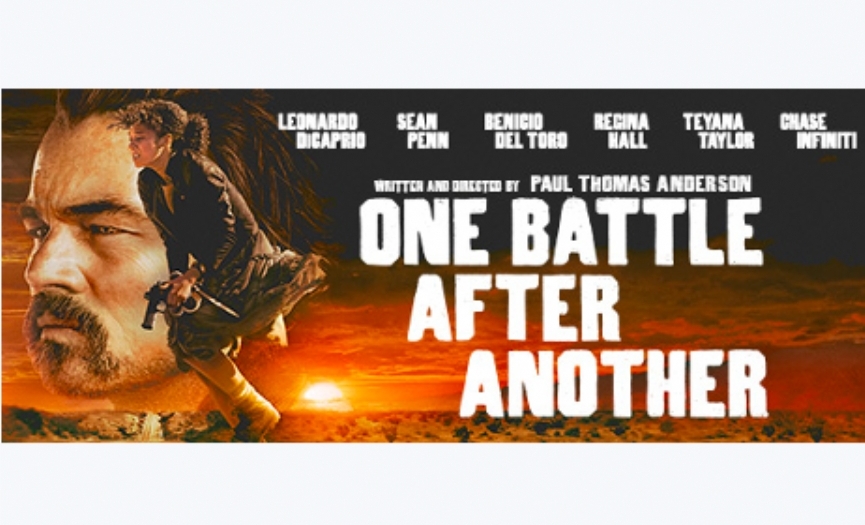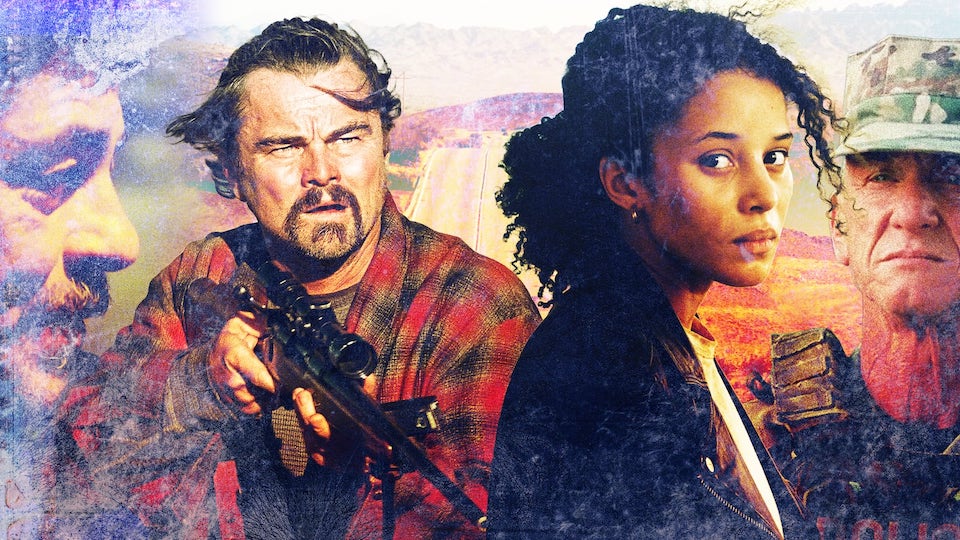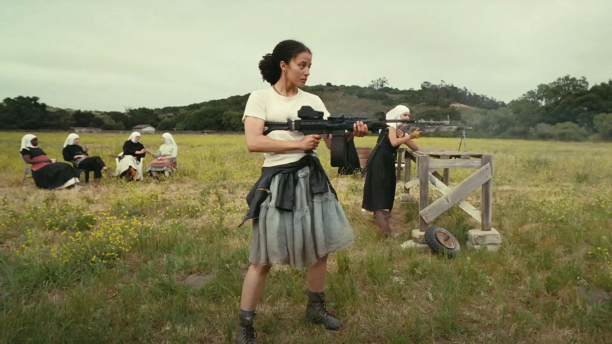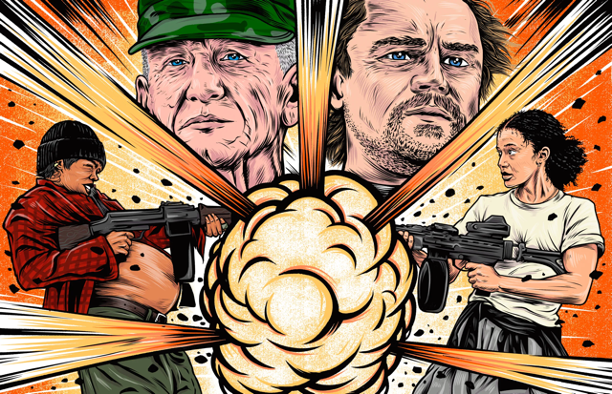
One Battle After Another - A Cinematic Rebellion

By Bessy ADUT
In One Battle After Another, Paul Thomas Anderson delivers a masterful adaptation of Thomas Pynchon's Vineland, transforming the 1990 novel into a contemporary epic that resonates with today's political climate. It is an action dark comedy thriller filled with some drama and tragedy. The film boasts a stellar ensemble cast including Leonardo DiCaprio, Sean Penn, Benicio del Toro, Regina Hall, Teyana Taylor, and Chase Infiniti. It follows an ex-revolutionary, Bob Ferguson (DiCaprio), who must rescue his daughter from a corrupt military official, navigating a world full of danger, deception, and moral ambiguity. The film is dedicated to first assistant director and producer Adam Somner, who tragically passed away in November 2024.
🎭 Performances and Character Depth
Leonardo DiCaprio portrays Bob Ferguson, a former revolutionary grappling with his past while attempting to save his daughter. DiCaprio's performance is both intense and nuanced, capturing the internal conflict of a man torn between duty, guilt, and survival. Teyana Taylor shines as Perfidia Beverly Hills, a fierce activist whose actions challenge the status quo. Sean Penn’s chilling portrayal of Colonel Steven J. Lockjaw embodies the authoritarian threat at the heart of the film’s conflict. Benicio del Toro, Regina Hall, and Chase Infiniti round out the cast with memorable, scene-stealing performances, making the ensemble a true highlight.

🎬 Direction and Cinematic Style
Anderson’s direction is ambitious and precise, blending elements of action, drama, and satire. The film’s pacing is relentless, with each scene propelling the narrative forward. The cinematography captures stark contrasts in the American landscape, from oppressive urban environments to expansive deserts, reflecting the characters’ internal struggles.
🎵 Music
I have to mention the music because it really stayed with me. The score was composed by Radiohead guitarist Jonny Greenwood and recorded with the London Contemporary Orchestra under the direction of Hugh Brunt. The atmosphere Greenwood creates is haunting and electrifying, perfectly complementing the film’s dark humor and tension. On top of that, the film features two songs by Jon Brion, marking his first collaboration with Anderson since Punch-Drunk Love in 2002. I found myself thinking about the music long after the film ended; it is clever, emotional, and so fitting for the story.
🏎️ Car Chase
One of the most thrilling sequences is the film’s car chase, which winds up and down roads in an original and exciting way. The tension is relentless, and I was especially happy to see Willa surviving and finally reaching her father. The emotional payoff, including a heartfelt letter from her mother, adds warmth and depth to an otherwise high-octane sequence.

🗳️ Political Themes and Social Commentary
At its core, One Battle After Another is a political commentary on the state of America. The film addresses issues such as immigration, authoritarianism, and the erosion of civil liberties. It seemed to me that references to ICE and neo-Nazi ideologies appear throughout the subtext of the movie, giving an extra layer of tension to the conflicts. Through his vehement anti-immigrant efforts, Lockjaw has become a colonel in the United States military and is invited to join the Christmas Adventurers Club, a secret society of far-right white supremacists. He hunts for Willa to cover up his interracial relationship, forbidden by the club. To accomplish his goal, he hires an Indigenous bounty hunter, Avanti Q, who captures Bob’s comrade Howard Sommerville, triggering a distress signal to the remaining French 75.
On Rotten Tomatoes, 96% of 346 critics’ reviews are positive. The website’s consensus reads, "An epic screwball adventure teeming with awe-inspiring action set pieces, One Battle After Another is Paul Thomas Anderson’s most entertaining film yet while also one of his most thematically rich." My personal critique is that I wish left activists weren’t shown as such violent terrorists. People already have a very negative view about the left, and it would be nice to see more peaceful approaches portrayed. I hope the daughter does better than her mom, perhaps a sequel could show a less violent confrontation, emphasizing growth and dialogue over chaos.
⏳ Time
Bob escapes through a tunnel and calls the French 75 for help, but is unable to remember the password. He seeks out Willa’s karate teacher and community leader, Sergio St. Carlos, who evacuates a stream of immigrants through a hidden tunnel. My favorite quote of the film comes from this sequence, "Time doesn’t exist and yet it controls us all." This line beautifully captures the surreal and philosophical undercurrent of the film, tying the intense action to a deeper meditation on control, fate, and human perception.

💭 Personal Reflections
Watching One Battle After Another, I found myself laughing, gasping, and even tearing up in unexpected moments. There’s something about Anderson’s mix of dark humor and heartfelt emotion that grabs me every time. I loved the way the film didn’t just entertain, it made me think about morality, loyalty, and the messiness of human choices. As a cinephile, I especially appreciated the reference to The Battle of Algiers, the 1966 Italian-Algerian war film that Bob Ferguson watches on TV. It felt like a subtle nod to revolutionary cinema, and it deepened my connection to Bob’s character and his journey. I also have to say, as someone who watches a lot of political thrillers, it’s refreshing to see a film that balances the weight of reality with the pure joy of cinematic adventure. And yes, I cheered silently when Willa finally got to her dad, because some victories, even small ones, feel like ours too.
🎯 Conclusion
One Battle After Another is a cinematic triumph that challenges its audience to reflect on the world around them. With stellar performances, a gripping narrative, and a timely message, it stands as one of the most significant films of 2025. Personally, it is my favorite film by Paul Thomas Anderson so far, combining his signature directorial mastery with a story that feels urgent and deeply human. It's a must-watch for those who appreciate cinema that not only entertains but also provokes thought.
“One Battle After Another is my favorite Paul Thomas Anderson film so far, combining his mastery with a story that feels urgent and deeply human.”
Related News









